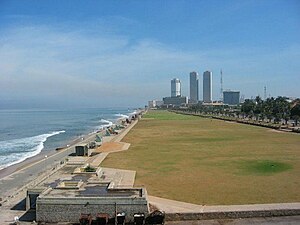 Image via WikipediaFormer US Embassy Baghdad DCM and now US Ambassador to Colombo, Patricia Butenis arrived in Sri Lanka on September 2009. The embassy's Deputy Chief of Mission, Valerie Fowler who previously served in Afghanistan also arrived in Sri Lanka around the same time. The OIG inspection of US Embassy Sri Lanka was conducted in Washington, DC, between April 6 and May 4, 2010 and in Colombo, Sri Lanka some eight months after the two senior officers arrived in country.
Image via WikipediaFormer US Embassy Baghdad DCM and now US Ambassador to Colombo, Patricia Butenis arrived in Sri Lanka on September 2009. The embassy's Deputy Chief of Mission, Valerie Fowler who previously served in Afghanistan also arrived in Sri Lanka around the same time. The OIG inspection of US Embassy Sri Lanka was conducted in Washington, DC, between April 6 and May 4, 2010 and in Colombo, Sri Lanka some eight months after the two senior officers arrived in country.
Below is an except from OIG inspection dated October 2010 discussing the experience deficit challenge in the mission. This, of course, could have been any post and is not unique to Colombo. And the large turnover and the disruption that comes with it are certainly non-news to anyone who's been around this particular road a bit.
After serving in Baghdad, the Ambassador has found heading a mission with a lower profile in Washington and much less experienced managers to be a challenge. In Colombo, all heads of sections and agencies, save two, are FS-02 officers serving initial tours in those positions. The DCM told the inspectors that Embassy Colombo is “blessed” with particularly good officers, even though none have served previously in South Asia, and all but one, including the DCM, are in their particular leadership positions for the first time. Colombo’s experience deficit puts a special responsibility on senior mission leaders to develop this next generation of Foreign Service leaders. One response has been to rotate opportunities to serve as acting DCM among section heads, thereby giving them a chance to expand their awareness of mission activities.The OIG inspectors provided several recommendations and informal recommendations in the report. For executive direction, see the following:
Embassy Colombo experienced a large turnover in embassy leaders when the Ambassador, DCM, and consular, economic, political, and regional affairs section chiefs all arrived in August and September 2009. In addition, some new section chiefs and the DCM had not attended appropriate first-time leadership training prior to taking their positions. Inspections worldwide have shown that not taking advantage of these opportunities increases the likelihood that mission leaders will find it difficult to identify, head off, and resolve problems as they arise. Especially where section chiefs are mid-career officers in their first positions of leadership and may only have a decade of experience, such training is an essential prerequisite (the DCM will attend the appropriate course this July). The inspection team made an informal recommendation in this regard.
The Ambassador prefers information to flow to her through decision and briefing memoranda, which reflects a change in leadership style from her predecessor. On her arrival, with a 100-day plan for introductory calls and familiarization events, the pressure to produce paper led to an increase in stress among staff and a sense that the work-life ratio that some expected in Colombo was out of balance. Staff has now fully adapted to the change in style.
The Ambassador and DCM came to Colombo from dangerous, high-threat assignments (Baghdad and Kabul, respectively). Their commitment to the safety and security of all mission staff is unquestioned. Since arrival, they have given great attention to security and emergency preparedness programs. They encouraged the regional security office to increase the number and frequency of drills, to regularize radio checks, and to test the emergency notification cascade. They also supported the consular section chief ’s initiative to reinvigorate the mission’s resident American citizen notification or warden system. The OIG team concluded that the Ambassador’s and DCM’s risk assessment and emphasis on security and emergency preparedness are appropriate.
Some new section chiefs and the DCM did not attend appropriate first-time leadership training prior to arrival at Embassy Colombo, even though such training can help mission leaders to identity, head off, or resolve problems. Leadership training should be a prerequisite for first-time section chiefs, especially for mid-career officers with limited professional experience in their initial leadership positions.
Informal Recommendation 1: Embassy Colombo should require that all new section chiefs participate in appropriate leadership training prior to taking up their duties in the mission. Mission staff is less cohesive than might be expected considering the quality-of-life and work experiences available in Colombo. At the middle-management level, officers do not communicate well to resolve problems at the lowest level possible. A relatively good American staff could be even better.
Informal Recommendation 2: Embassy Colombo should determine an effective approach that will help to overcome inadequate communication and problem solving at the lowest possible level and organize activities as soon as possible.
Related item:
OIG Report No. ISP-I-11-02A - Inspection of Embassy Colombo, Sri Lanka - October 2010



No comments:
Post a Comment